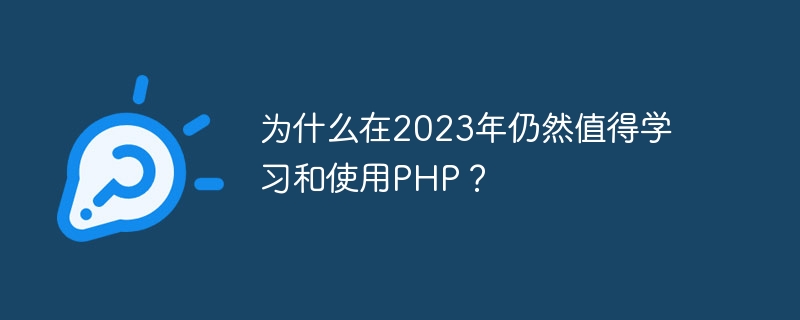Home >Backend Development >PHP Tutorial >Why is it still worth learning and using PHP in 2023?
Why is it still worth learning and using PHP in 2023?
- WBOYWBOYWBOYWBOYWBOYWBOYWBOYWBOYWBOYWBOYWBOYWBOYWBOriginal
- 2023-09-10 14:19:421715browse

In 2023, the development of the technology field is in full swing, and new programming languages are emerging one after another. However, in this era of innovation, why is PHP still worth learning and using? This article will explore this issue from several aspects.
First of all, PHP is a mature, stable and widely used programming language. The history of PHP can be traced back to the early 1990s, and it has been developed for nearly 30 years. During this period, PHP has experienced multiple versions of updates and evolutions, and has gradually become a powerful language that is easy to learn and use. Due to its open source code and active development community, PHP has a rich set of extension libraries and frameworks to meet the needs of different projects. Many well-known websites and applications, such as Facebook, Wikipedia and WordPress, are developed based on PHP, which proves the reliability and powerful performance of PHP in practical applications.
Secondly, PHP is widely used in the field of web development. Whether it is a simple personal website or a complex e-commerce platform, PHP can provide powerful solutions. It supports database connections and operations, and can be seamlessly integrated with mainstream databases such as MySQL, PostgreSQL and Oracle. PHP also provides a wealth of operating functions and class libraries, allowing developers to easily handle common tasks such as form validation, file uploading, and email sending. In addition, PHP also has extensions for advanced functions such as processing images, generating PDF, and operating XML, providing developers with more possibilities.
Third, PHP is a language with high development efficiency. Compared with other programming languages, PHP has a concise and intuitive syntax, making development work more efficient. It uses dynamic typing, eliminating the need to declare variable types in advance, which improves the flexibility of the code. In addition, PHP also supports object-oriented programming, making the organization and management of code more convenient. For beginners, PHP has a relatively low learning curve and is easy to get started. Even experienced developers can quickly debug and test code through built-in debugging tools and development environment to improve work efficiency.
Finally, PHP has a large development community and rich resource support. There are a huge number of PHP developers around the world, forming a large and active community. In this community, developers actively share experiences, answer questions, and improve their technical skills through communication and mutual assistance. In addition, the PHP community also provides a large number of online tutorials, documents and sample codes, providing rich resources for learners and developers. By participating in open source projects, submitting code, or contributing their own experience, developers can also accumulate experience, increase their visibility, and open up a broader career development path.
To sum up, in 2023, although new programming languages are emerging one after another, PHP is still worth learning and using. PHP's maturity, stability and wide application make it reliable and excellent in actual projects. Its wide application in the field of web development, efficient development features, and strong development community and resource support have brought huge advantages to learners and developers. Therefore, for people who love programming and web development, learning and using PHP is still of great significance.
The above is the detailed content of Why is it still worth learning and using PHP in 2023?. For more information, please follow other related articles on the PHP Chinese website!

